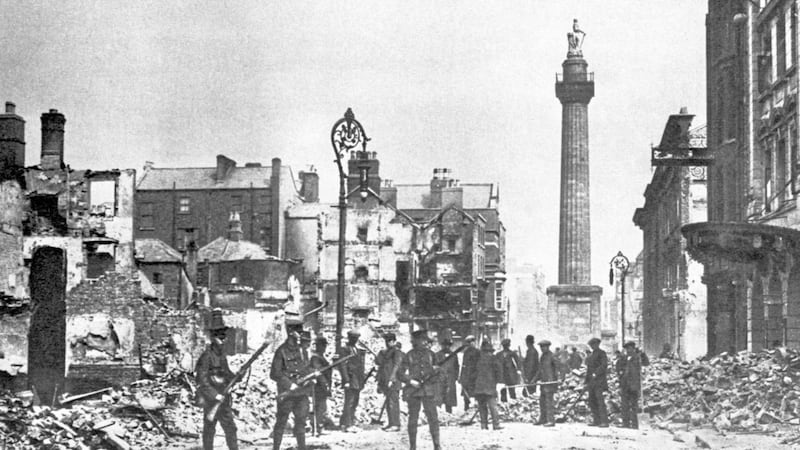On this day 105 years ago, a group of daring and brave revolutionaries took their lives in their hands and struck a mortal blow against the most powerful empire of the time – the British.
The odds were overwhelmingly stacked against them. But their courage and vision was more than a substitute for the lack of munitions.
On Easter Monday 1916, the scholarly leader of these ambitious men and women, Padraig Pearse, declared the Irish Republic on the steps of the GPO in the seminal words of the 1916 Proclamation.
The uprising triggered off a series of events the consequences of which are still being worked out in Irish-British politics to this day.
The issue that led Padraig Pearse, James Connolly and the other leaders of the Rising to the yard in Kilmainham Gaol, where they were summarily executed by British firing squads, is the same issue that has dominated Irish-British politics for centuries to this day – the independence of Ireland.
At the weekend, and in keeping with Covid guidelines, republicans all over Ireland and elsewhere commemorated the 1916 Rising and paid homage to those martyrs who lost their lives during the Rising and since and especially those who paid the ultimate sacrifice in recent times.
The Ireland that produced Pearse, Connolly and Markievicz, De Valera and Collins, Carson and Craig was similar to the Ireland that produced Hume, McGuinness, Adams, Paisley and Trimble.
The Ireland that produced MacDonald, O’Neill, Eastwood, Martin, Varadkar and Foster, Aiken and Long is a vastly different Ireland.
However, the issue that is central to the political lives of the aforementioned is the same – the independence of Ireland.
But the context in which it is to be achieved is different.
The context is different because peace and dialogue has replaced war.
And around peace a new, fairer and more prosperous Ireland is being built by all the political parties in the institutions that govern people’s lives – whether at the level of council, assembly, Dail or Seanad.
And these institutions have functioned within the wider framework of the all-Ireland institutions of the Good Friday Agreement and the associated bodies committed to human rights and equality.
Much progress has been made and more has yet to be done especially in relation to policing, legacy and the Irish language.
During this time society has also undergone significant change, north and south especially with respect to marriage equality, women’s health care and a more pluralist and tolerant way of life.
All political parties across this island can rightly lay claim to playing a part in bringing about the significant changes that have taken place since the ceasefires of the mid-90s.
So, it is timely that political society would turn its collective attention to trying to resolve the issue of partition and the independence of this country.
And we are now in the midst of that debate – a debate which is being influenced by many factors: the referendum on constitutional change, Brexit, the role of the Irish government, demographic changes in the north, the place of unionists in a united Ireland, the growth of Sinn Féin and the Alliance Party, the minority status of the unionist parties, Ireland’s Future organisation, membership of the EU and the economic and health benefits of a united Ireland.
Many issues to be debated and a few weeks ago we go a perfect demonstration of how everyone with a vested interest in the future can participate.
The week started with Claire Byrne’s 90-minute debate on national television about the merits of a united Ireland. It ended with a proposal, which the Seanad’s Fine Gael leader, Regina Doherty agreed with, from Seanadoir Niall O Donnghaile, who I work with, that the Seanad should set up a committee to provide a platform for the debate.
In between the issue was debated in the Good Friday Agreement committee for the third week in a row; Fianna Fail TD, Jim O'Callaghan delivered a comprehensive, thoughtful, rational and logical speech on reunification; the tánaiste, Leo Varadkar, and the executive's finance minister Conor Murphy, joined representatives from eight councils, including Dublin and Belfast to discuss a plan to turn the eastern seaboard into an ‘economic power house’ and ‘Ireland’s Future’ launched its economic plans for unity.
This national debate has energy, novel ideas, optimism, is forward looking and is open to all to join it.








